WhatsApp Business Account Price Guide for 2025
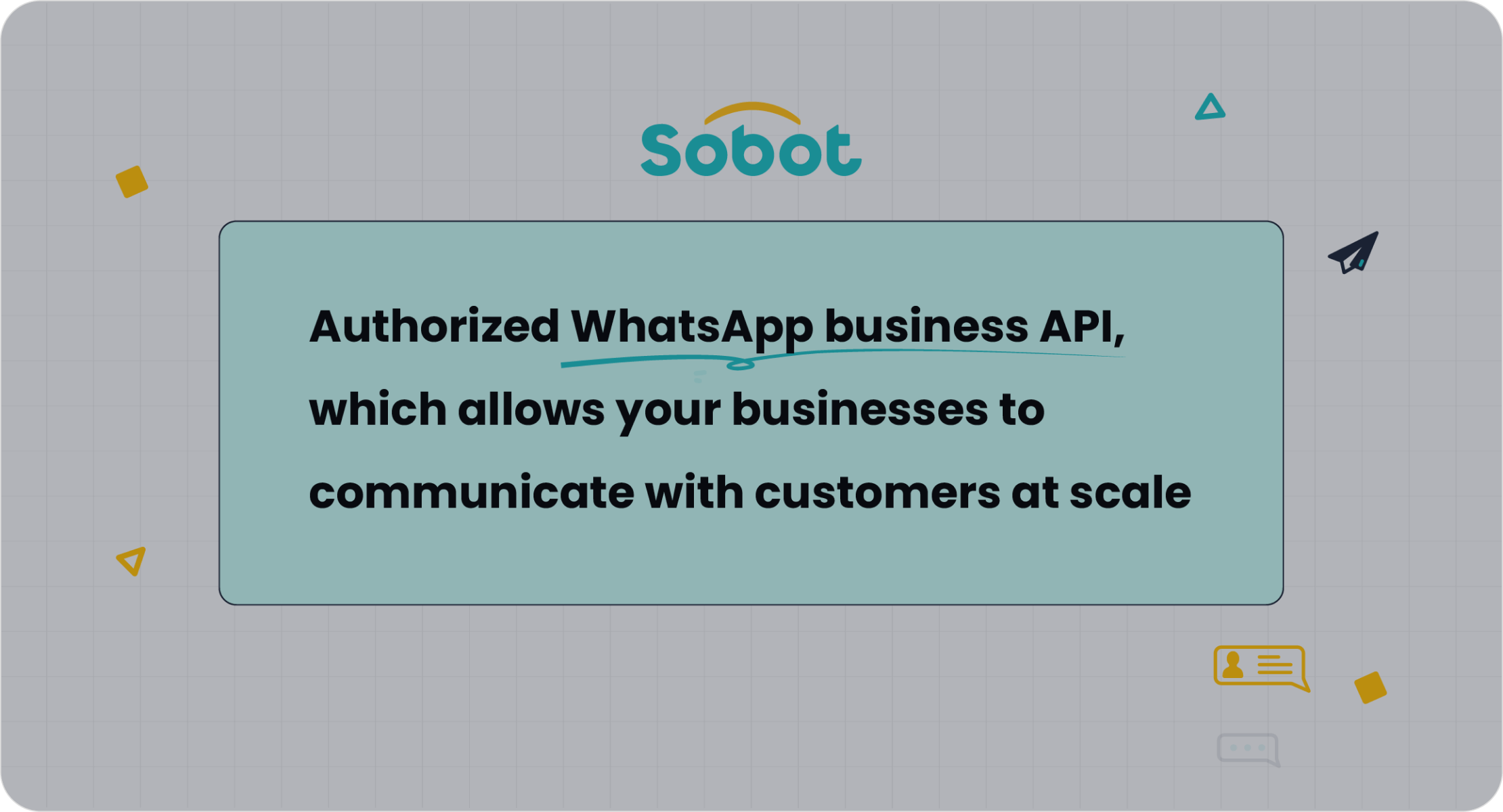
Understanding the WhatsApp Business account price in 2025 is essential for managing your business expenses effectively. The pricing model follows a tiered structure, starting at $0.0085 per message for the first 250,000 messages and decreasing to $0.0058 per message for volumes exceeding 10 million. This structure allows you to scale customer communications while optimizing costs. Businesses using WhatsApp for customer engagement can grow sales by 160% and reduce service costs by 73%, making it a game-changing platform.
Sobot’s WhatsApp Business API offers tools like bulk messaging, 24/7 chatbot support, and smart chat routing, helping you maximize efficiency. If you’re wondering how to get a WhatsApp Business API account, Sobot simplifies the process, ensuring seamless integration and high ROI. With its advanced features, Sobot empowers you to enhance customer engagement while maintaining cost control.
Overview of WhatsApp Business API and Pricing
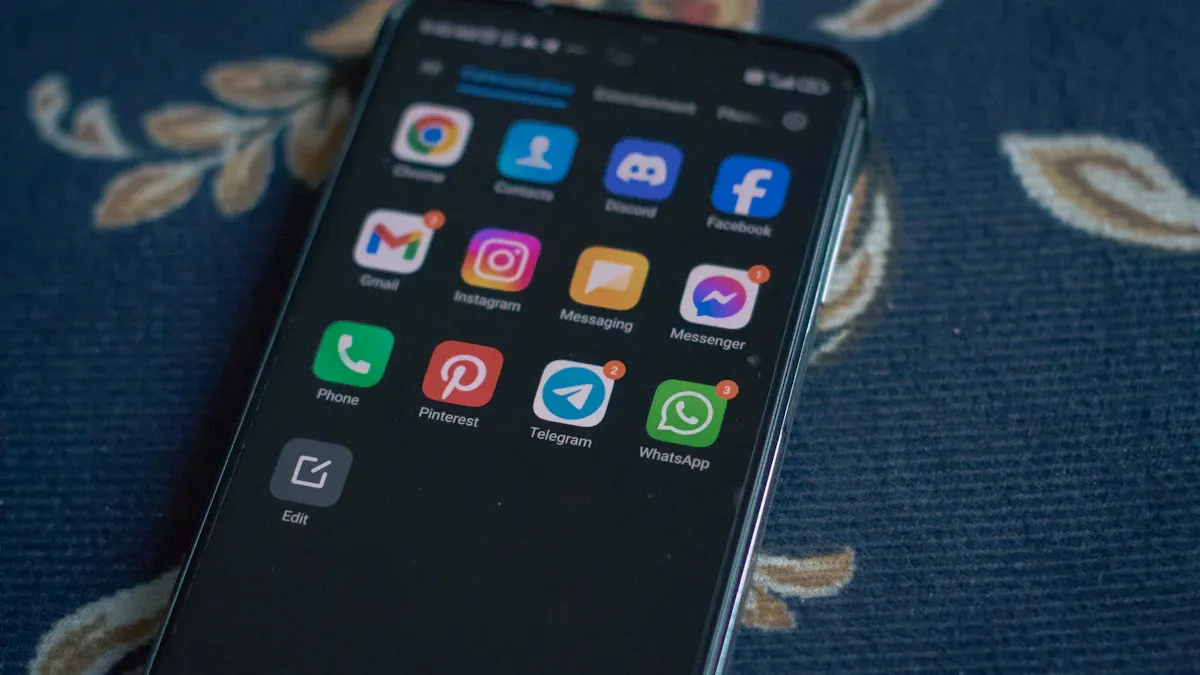
What is the WhatsApp Business API?
The WhatsApp Business API allows businesses to communicate with customers at scale using the popular messaging platform, WhatsApp. It is designed for medium to large enterprises that need to manage high volumes of customer interactions efficiently. Unlike the standard WhatsApp Business app, the API integrates with your existing systems, enabling automation, analytics, and multi-agent support.
Businesses worldwide have embraced the WhatsApp Business API for its ability to improve customer engagement. For example, over 50 million companies now use WhatsApp for marketing, and daily interactions with business accounts exceed 175 million. The API also boasts a 98% message open rate, far surpassing email. These statistics highlight its effectiveness in reaching customers quickly and reliably.
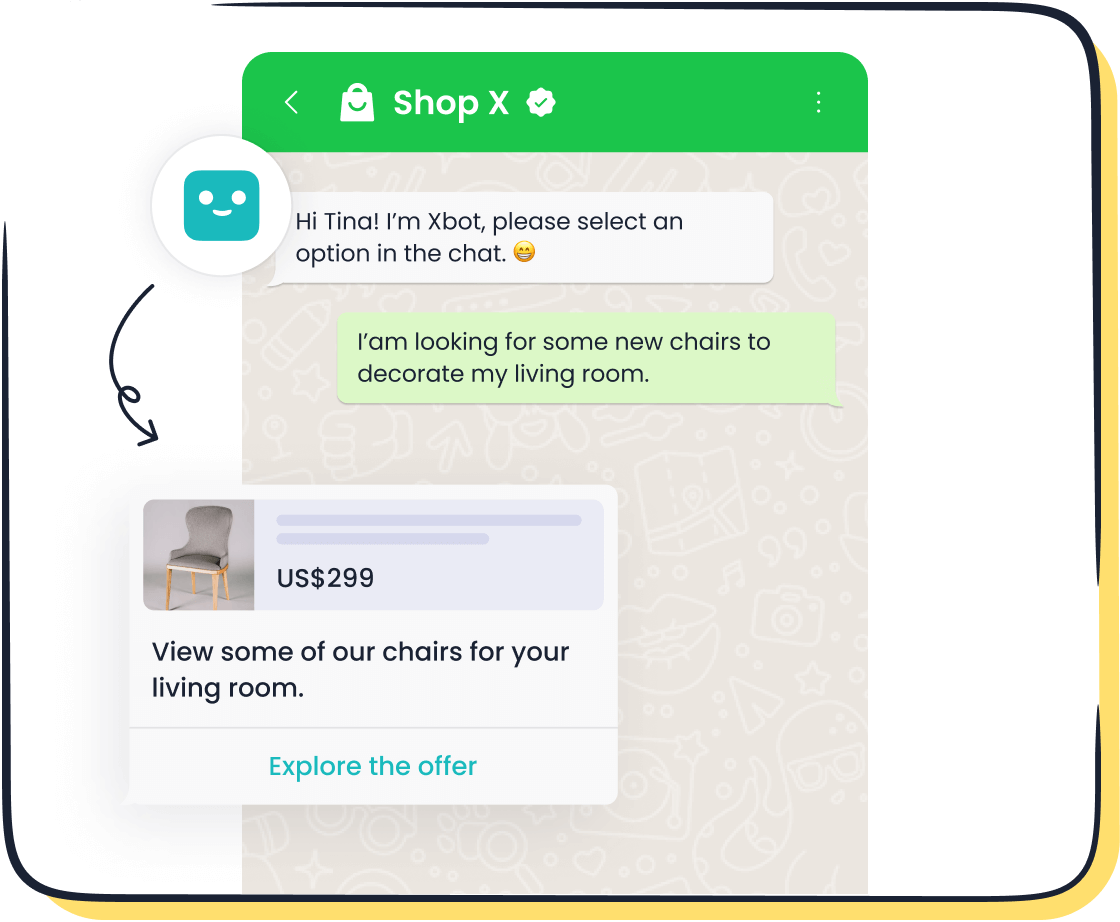
Key features of Sobot’s WhatsApp Business API
Sobot’s WhatsApp Business API offers a range of features tailored to enhance your communication strategies. These include:
- Bulk Messaging: Send promotional or transactional messages to large audiences effortlessly.
- 24/7 Chatbot Support: Provide instant responses to customer inquiries, improving satisfaction.
- Smart Chat Routing: Direct messages to the right team or agent for faster resolution.
- Workflow Automation: Automate marketing campaigns and data collection to save time.
- Data Analytics: Gain insights into customer behavior and campaign performance.
Sobot also ensures your WhatsApp Business account is officially certified, adding credibility to your brand. With these tools, you can streamline operations, reduce costs, and boost marketing ROI.
Why businesses should consider WhatsApp API pricing in 2025
Understanding WhatsApp API pricing is crucial for planning your 2025 budget. The conversation-based pricing model charges differently for user-initiated and business-initiated interactions. For instance, sales teams may find monthly plans cost-effective for high-value conversations, while support teams benefit from service conversation pricing, which charges only once within a 24-hour window.
The WhatsApp Business API delivers measurable benefits. Campaigns achieve a 90% delivery rate, and conversion rates improve by 40-50%. Additionally, businesses using WhatsApp chatbots report a 35% reduction in response times. These advantages make the API a valuable investment, especially when paired with Sobot’s cost-effective solutions.
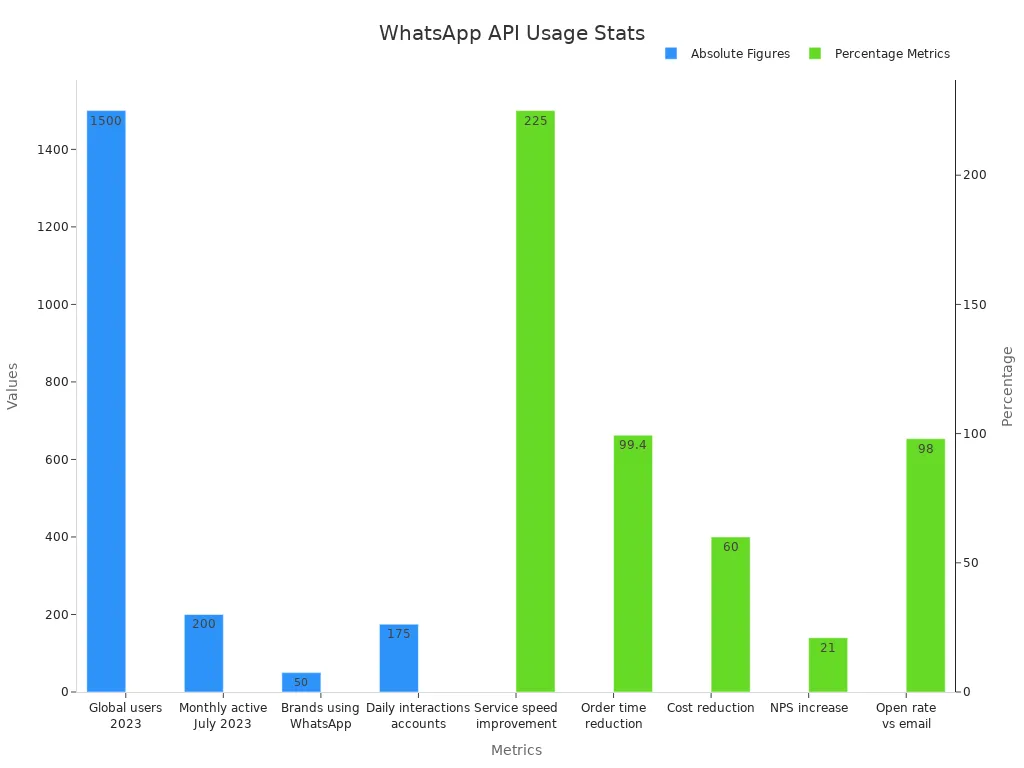
By choosing Sobot as your WhatsApp Business Solution Provider, you gain access to advanced features and expert support, ensuring you maximize the value of your investment.
Understanding WhatsApp API Pricing Models
Conversation-based pricing: How it works
WhatsApp Business API uses a conversation-based pricing model, which charges businesses based on the type of conversation they initiate or receive. Each conversation lasts for 24 hours, starting from the first message sent by either the business or the user. This model ensures transparency and allows you to predict costs more effectively.
Conversations fall into four main categories:
| Conversation Type | Description | Charges |
|---|---|---|
| Utility conversations | Enable customers to make requests and get updates about transactions. | Charged per message if sent outside the 24-hour window. |
| Authentication conversations | Used for confirming user identity through one-time passcodes. | Charged per message if sent outside the 24-hour window. |
| Marketing conversations | Involve promotional offers and notifications. | Charged per message if sent outside the 24-hour window. |
| Service conversations | Initiated by users to get queries answered. | Free within the 24-hour customer service window. |
Starting July 1, 2025, WhatsApp will transition to per-message pricing for outbound templates. This change will impact marketing, authentication, and utility conversations. However, user-initiated conversations will remain free within the 24-hour service window, helping you manage costs effectively.
User-initiated vs. business-initiated conversations
Understanding the difference between user-initiated and business-initiated conversations is key to optimizing your WhatsApp Business API costs. A user-initiated conversation begins when a customer sends a message to your business. These conversations are free within the 24-hour service window, allowing you to respond without incurring additional charges. For example, if a customer asks about a product, you can reply and continue the conversation at no cost.
In contrast, a business-initiated conversation starts when your business sends the first message. This could include sending order updates, promotional offers, or reminders. These conversations incur a charge, but the cost per conversation depends on the type of message and the region. For instance, in India, a user-initiated conversation costs ₹0.35, while business-initiated conversations vary based on their purpose.
By leveraging Sobot’s WhatsApp Business API, you can automate responses to user-initiated messages and strategically plan business-initiated conversations. This approach ensures you maximize engagement while keeping costs under control.
Benefits of the conversation-based pricing model
The conversation-based pricing model offers several advantages for businesses. First, it provides cost predictability. You know exactly how much each type of conversation will cost, allowing you to budget effectively. Second, it encourages meaningful interactions. Since user-initiated conversations are free within the 24-hour window, you can focus on providing excellent customer service without worrying about additional charges.
This model also supports scalability. For example, businesses like Tata CliQ and Unilever have used the WhatsApp Business API to achieve impressive results. Tata CliQ integrated the API for order notifications, resulting in a 10x ROI and a 57% click-through rate. Similarly, Unilever leveraged WhatsApp for marketing campaigns in Brazil, boosting sales and customer engagement.
Sobot’s WhatsApp Business API enhances these benefits with features like bulk messaging, 24/7 chatbot support, and smart chat routing. These tools help you manage high volumes of conversations efficiently, ensuring you get the most value from your investment.
Tip: Use Sobot’s data analytics to track your conversation costs and identify areas for improvement. This insight can help you optimize your WhatsApp Business API pricing strategy.
Regional Variations in WhatsApp Business API Pricing

Factors influencing regional pricing differences
WhatsApp Business API pricing varies significantly across regions due to several factors. Local economic conditions play a major role. Countries with lower average incomes often have reduced pricing to encourage adoption. Regulatory policies also influence costs. For instance, regions with strict data privacy laws may see higher operational expenses, which reflect in the pricing. Additionally, the level of WhatsApp adoption in a region impacts pricing. Markets with high user engagement, like India and Brazil, often benefit from competitive rates.
Currency exchange rates further contribute to these differences. For example, pricing in countries like Indonesia and India is adjusted to align with their local currencies. These factors collectively shape the cost structure, making it essential for businesses to understand regional variations when planning their WhatsApp Business API strategy.
Examples of pricing in key regions
The cost of using the WhatsApp Business API differs widely across countries. Below is a table showcasing pricing for marketing, utility, and authentication conversations in select regions:
| Country | Marketing | Utility | Authentication |
|---|---|---|---|
| Indonesia | $0.046 | $0.0278 | $0.0337 |
| UAE | $0.043 | $0.021 | $0.020 |
| India | ₹0.882 | ₹0.16 | ₹0.129 |
| Netherlands | 0.1597 | 0.08 | 0.072 |
| Russia | 0.0802 | 0.0477 | 0.0429 |
In addition, the chart below highlights pricing variations for marketing, utility, authentication, and service conversations in major markets like Brazil, Egypt, and Germany:
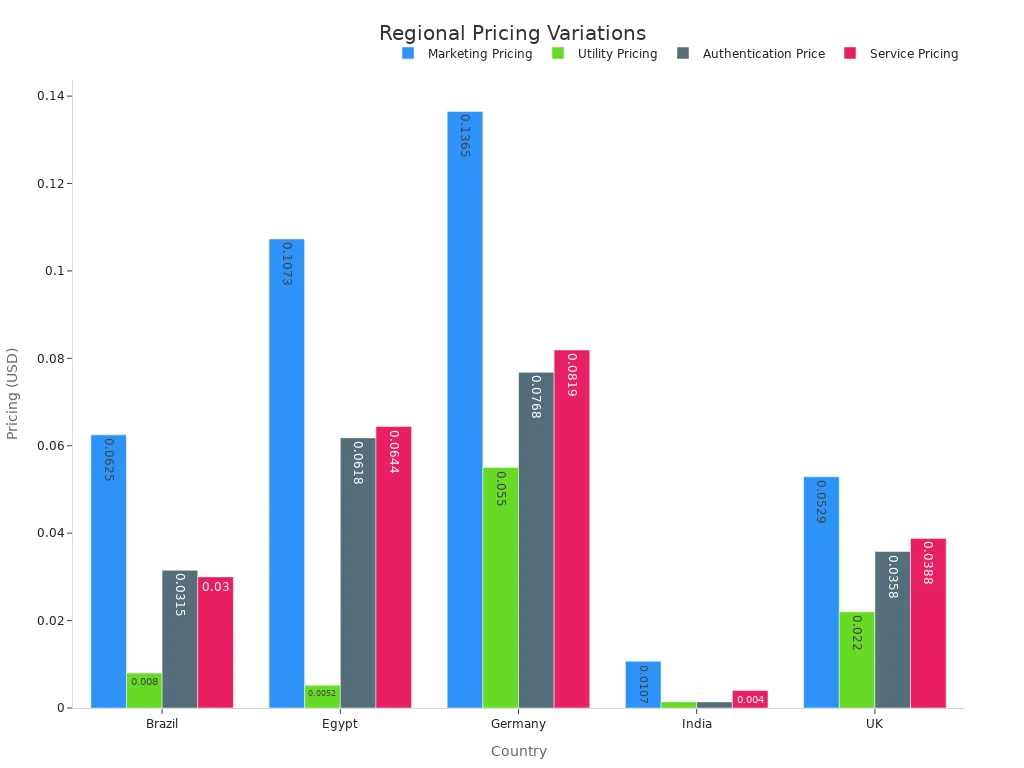
These examples illustrate how pricing aligns with regional economic and market conditions, helping businesses plan their budgets effectively.
How Sobot helps businesses navigate regional pricing
Sobot simplifies the complexities of regional pricing for businesses. By offering tailored solutions, Sobot ensures you only pay for what you need. For example, Sobot’s WhatsApp Business API includes features like data analytics and workflow automation. These tools help you monitor costs and optimize your communication strategy based on regional pricing trends.
Sobot also provides expert guidance to help you navigate pricing structures in different markets. Whether you operate in Southeast Asia, Europe, or the Middle East, Sobot’s solutions adapt to your needs. For instance, J&T Express, a logistics company, used Sobot’s WhatsApp API to improve delivery rates by 35% while reducing costs by 50%. This demonstrates how Sobot empowers businesses to maximize value while managing costs effectively.
Tip: Use Sobot’s bulk messaging and chatbot features to reduce operational costs and enhance customer engagement across regions.
Updates to WhatsApp Business API Pricing in 2025
Key changes in the 2025 pricing model
WhatsApp has introduced significant updates to its pricing structure for 2025. The most notable change is the shift to per-message pricing. Instead of charging per conversation session, businesses will now pay based on the number of messages sent. This update allows for more precise billing and better cost management. Additionally, WhatsApp has categorized messaging rates into distinct types, such as marketing, authentication, and utility messages. Each category has its own pricing, enabling businesses to align their communication strategies with their budgets.
The rollout of these changes will occur in two phases. Phase 1 begins on May 1, 2025, and Phase 2 follows on July 1, 2025. This phased approach ensures businesses have time to adapt to the new billing process. By understanding these updates, you can plan your WhatsApp Business API strategy effectively and avoid unexpected costs.
| Change Type | Details |
|---|---|
| Per-Message Billing | Businesses will be charged based on the number of messages sent, rather than per conversation session. |
| Categorized Messaging Rates | Different types of messages will have distinct pricing (e.g., marketing, authentication). |
| Rollout Schedule | Phase 1 starts on May 1st, 2025; Phase 2 starts on July 1st, 2025. |
New features impacting WhatsApp API pricing
Several new features introduced in 2025 will influence WhatsApp API pricing. Starting November 1, 2024, service conversations will become entirely free, replacing the previous limit of 1,000 free conversations. This change benefits businesses by reducing costs for customer support. From February 1, 2025, international authentication rates will expand to seven new markets, with reductions in existing ones. This update makes global communication more affordable.
Additionally, utility templates will be free within a 24-hour window starting April 1, 2025. This feature allows you to send transactional updates without incurring extra charges. By July 1, 2025, all businesses will transition to per-template message pricing, ensuring consistency in billing across regions. These updates provide opportunities to optimize your WhatsApp Business API costs while enhancing customer engagement.
| Date | Change Description |
|---|---|
| November 1, 2024 | Service conversations will be free, replacing the previous limit of 1000 free service conversations. |
| February 1, 2025 | International authentication rates will cover 7 new markets, with reductions in existing markets. |
| April 1, 2025 | Businesses can use utility templates for free within a 24-hour window. |
| April 1, 2025 | Transition to per-template message pricing for Phase 1 businesses. |
| July 1, 2025 | All businesses will be charged per template message in Phase 2 rollout. |
How Sobot’s WhatsApp API adapts to these updates
Sobot’s WhatsApp Business API ensures you stay ahead of these changes. With features like data analytics and workflow automation, Sobot helps you monitor your billing and optimize your communication strategy. For example, you can track the cost of marketing and authentication messages in real time, ensuring you stay within budget.
Sobot also simplifies the transition to per-message pricing. Its platform supports bulk messaging and 24/7 chatbot responses, allowing you to manage high volumes of conversations efficiently. By leveraging Sobot’s solutions, you can take full advantage of free service conversations and utility templates. This approach not only reduces costs but also enhances customer satisfaction. Sobot’s expertise ensures you navigate the updated WhatsApp Business API billing process seamlessly.
Tip: Use Sobot’s advanced analytics to identify cost-saving opportunities and improve your WhatsApp Business API strategy.
Strategies for Optimizing WhatsApp API Costs
Tips for reducing conversation costs
Reducing costs when using the WhatsApp Business API requires strategic planning and efficient execution. Start by managing your inbound and outbound conversations effectively. For instance, respond to user-initiated messages within the 24-hour service window to avoid additional charges. This approach ensures you maximize free service conversations while maintaining customer satisfaction.
Segmenting your audience can also help you tailor communication strategies. For example, businesses handling large-scale collections can personalize messages based on customer profiles, such as the age of a debt. This personalization improves engagement and reduces the need for follow-up messages. Additionally, testing message templates allows you to identify which formats drive the best results, optimizing future communications.
Another cost-saving strategy involves consolidating multiple communication types under a single WhatsApp number. This reduces the need for additional accounts and simplifies session tracking. By leveraging analytics tools, you can monitor performance in real-time and adjust your strategies to ensure cost efficiency.
Leveraging Sobot’s automation features for cost savings
Sobot’s WhatsApp Business API offers automation features that significantly reduce operational costs. For example, the 24/7 chatbot support handles inbound queries instantly, minimizing the need for human intervention. This feature not only saves time but also ensures consistent customer service.
Workflow automation is another powerful tool. With Sobot, you can automate outbound marketing campaigns and transactional updates. For instance, businesses can schedule bulk messages for promotional offers or reminders, ensuring timely delivery without manual effort. This automation reduces labor costs and improves efficiency.
Data analytics provided by Sobot further enhances cost-saving strategies. By analyzing customer behavior, you can identify trends and adjust your communication workflows. For example, a market research firm using WhatsApp surveys saved $10,000 annually by reducing non-responses. Sobot’s analytics tools enable similar optimizations, helping you achieve measurable savings.
Choosing the right conversation type for your business goals
Selecting the appropriate conversation type is crucial for optimizing WhatsApp API pricing. Service conversations, which are free within the 24-hour window, are ideal for addressing customer queries. Businesses can use these interactions to build trust and improve satisfaction without incurring additional costs.
For outbound communications, such as marketing or authentication messages, focus on timing and relevance. Sending promotional offers during peak engagement times increases the likelihood of conversions. Similarly, using utility templates for transactional updates ensures customers receive timely information, enhancing their experience.
Sobot’s WhatsApp Business API simplifies this process with features like smart chat routing and bulk messaging. These tools help you align your communication strategies with your business goals. For example, J&T Express used Sobot’s solutions to optimize delivery notifications, achieving a 35% increase in delivery rates while cutting costs by 50%. By choosing the right conversation type and leveraging Sobot’s tools, you can achieve similar results.
Tip: Use Sobot’s advanced analytics to track the performance of different conversation types. This data helps you refine your strategies and maximize cost-effectiveness.
Choosing the Right WhatsApp Business API Provider
Why Sobot is a trusted WhatsApp Business Solution Provider
Sobot has established itself as a reliable WhatsApp Business Solution Provider by delivering exceptional results for businesses across industries. With over 10,000 brands served, Sobot has consistently improved customer satisfaction and operational efficiency. For example, Samsung achieved a 97% Customer Satisfaction Score (CSAT) using Sobot’s solutions, while Agilent reported a sixfold increase in service efficiency. These success stories highlight Sobot’s ability to meet diverse business needs.
Sobot’s WhatsApp Business API offers advanced features like bulk messaging, 24/7 chatbot support, and workflow automation. These tools help businesses streamline communication and reduce costs. Additionally, Sobot’s official certification as a Meta Business Solution Provider ensures reliability and trustworthiness. By choosing Sobot, you gain access to a platform designed to enhance customer engagement and drive measurable results.
Comparing providers: Features, pricing, and support
When selecting a WhatsApp Business API provider, comparing features, pricing, and support is essential. Below is a table summarizing key differences among popular providers:
| Feature | WebMaxy | Twilio | WATI | Zoko |
|---|---|---|---|---|
| Pricing | Affordable & scalable | Higher cost for small businesses | Limited features | Higher-tier plans |
| Integration | No-code & API integrations | Requires developer effort | Limited | Shopify-focused |
| Automation | AI-driven chatbot | Basic automation | Rule-based | N/A |
| Analytics | Advanced real-time analytics | Limited insights | N/A | N/A |
| Customer Support | 24/7 dedicated support | Standard support | N/A | Business hours only |
| Scalability | Enterprise-ready | N/A | N/A | Small business-focused |
| E-commerce Integration | Extensive (Shopify, WooCommerce) | N/A | N/A | N/A |
Sobot stands out with its enterprise-ready scalability, advanced analytics, and 24/7 dedicated support. These features make it an ideal choice for businesses aiming to optimize their WhatsApp communication strategies.
Ensuring seamless integration with Sobot’s solutions
Sobot simplifies the integration process, ensuring your business can start using WhatsApp effectively without technical hurdles. Its no-code and API integration options allow you to connect WhatsApp with existing systems like CRMs and data warehouses. This flexibility ensures a smooth transition and minimizes downtime.
For example, J&T Express used Sobot’s WhatsApp API to enhance delivery notifications and address confirmation processes. This integration led to a 35% increase in delivery rates and a 50% cost reduction. Sobot’s solutions also include data analytics, enabling you to monitor performance and refine your strategies. By choosing Sobot, you ensure a seamless integration that supports your business goals.
Tip: Use Sobot’s workflow automation to streamline repetitive tasks and improve efficiency.
Understanding WhatsApp Business API pricing is essential for your business in 2025. The conversation-based pricing model offers transparency and cost predictability, making it easier to plan your budget. By leveraging automation and analytics, you can reduce operational costs and focus on meaningful customer interactions. For example, automation through WhatsApp API efficiently handles queries, allowing your team to address complex issues.
To manage costs effectively, choose a provider that aligns with your goals. Sobot’s WhatsApp Business API simplifies communication with features like bulk messaging and 24/7 chatbot support. These tools enhance customer loyalty and trust while offering a cost-effective solution compared to traditional methods like SMS marketing. With Sobot, you gain a reliable partner to optimize your communication strategy and achieve measurable results.
Tip: Start using Sobot’s WhatsApp Business API today to improve customer engagement and reduce costs.
FAQ
What is the WhatsApp Business API, and who should use it?
The WhatsApp Business API is a tool for businesses to communicate with customers at scale. It suits medium to large enterprises needing features like automation, analytics, and multi-agent support. For example, companies like J&T Express use it to improve delivery efficiency and reduce costs.
How does the WhatsApp Business API differ from the standard app?
The API integrates with your systems, enabling automation, bulk messaging, and analytics. Unlike the standard app, it supports multiple agents and advanced workflows. Businesses using the API, such as Samsung, achieve higher customer satisfaction and operational efficiency.
Can small businesses benefit from the WhatsApp Business API?
Yes, small businesses can use the API to automate responses, send bulk messages, and analyze customer interactions. For instance, a small retailer can use it to send promotional offers and track engagement, improving sales and customer loyalty.
How does Sobot simplify WhatsApp Business API integration?
Sobot offers no-code and API integration options, making it easy to connect WhatsApp with your CRM or other systems. Its platform includes features like workflow automation and data analytics, ensuring a seamless setup and efficient operations.
What are the costs associated with using the WhatsApp Business API?
Costs depend on conversation types, such as marketing or service. For example, user-initiated conversations are free within a 24-hour window. Sobot’s tools help you monitor and optimize these costs, ensuring you stay within budget.
See Also
Setting Up Batch Messaging For Your WhatsApp Business Account
Guide To Comparing Costs Of Live Chat Support Services
The Impact Of WhatsApp Chat On Website Engagement Rates
Effective Strategies For Integrating WhatsApp On Your Website
Reviewing The Best Free Chat Software Options For Businesses